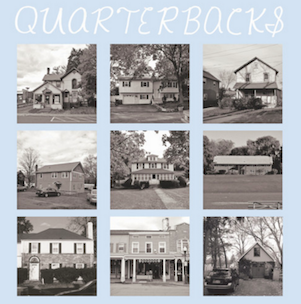At 19 songs in 22 minutes, Quarterbacks’ self-titled album reads like two different time zones of a Stephin Merritt mixtape, in quick with the hook, on to the next punchline before you can wrap your head around the previous.
If you were to thread some guiding narratives through the upstate New Yorker’s first LP push here, portions reveal just another young millennial wandering through the jungles of attraction. Elsewhere we could have a severe ‘Missed Connections’ repeat offender on our hands that might need a push into a healthier reality, as heard on “Not in Luv:” [LISTEN]
My heart beats like/A bowling ball/That slowly turns/And rolls along
That song in particular bleeds early adolescence and the habit to mistake chronic schoolyard crush syndrome with gravity-defying, maddening love. The kind of ‘L-U-V’ you’d see scrawled in a spiral.
Comparatively, there are moments we hear singer/guitarist Dean Engle insert some sneaky moments of thoughtful deduction. In “Center,” despite any natural fight or flight instincts, our dude walks away from any gesture that is anything but grand and now must watch his connection with another short circuit, which could perhaps be only a result of his idleness: [LISTEN]
Because there’s such/Relief in coincidence/A universe that finally works/How you always suspected/With yourself near the center/As I get older/I recognize that love/Is mostly situational
Though such inaction may seem initially frustrating, “Point Nine” brings up another valid theme that is interwoven, albeit sloppily, throughout the entire album: Love, whatever that means, is situational.
Feelings can be reciprocated, fleeting, undeveloped or exhilarating and that’s the maddening umbrella-like characteristic of love, which is probably why people like to sing about it so much. It’s a one-stop shop, a buffet of feelings; you can stay forever or more like Dean’s speed, just a quick hello and a good cry into your pillow: [LISTEN]
Sometimes I wonder if I could slow down make sure my heart stays intact
The album contains songs that barely live beyond two minutes, reflecting the possible nature of Engle’s personal projections regarding the subject matter. Our day-to-day lives rarely feature perfectly orchestrated interactions, curated dialogues, or award nominations. That would make a person less tangible.
And in a century when so much of reality is questioned on the daily, it’s nice just to confront the world that lives only right in front of us. In fact, our experiences or relationships do in fact have points, no matter how dull they are. Or rather, another piece of Engle “Point Nine” minute-and-a-half wisdom:
I have no expectations for the future/The present’s too perfect for that











